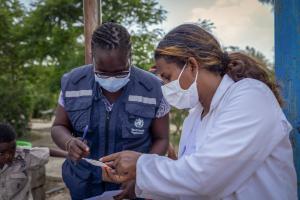Outbreak response training bolsters Mozambique’s cholera control
Maputo – Dr Cremildo Rajabo has new confidence entering the cholera treatment centre in Lichinga district in northern Mozambique, one of the areas hardest-hit by the outbreak.
“I have experience managing cholera cases in my province since 2012, but the work dynamic is completely different during outbreaks. We have to work very fast and we are often overstretched as we still have to look after patients outside the centres,” he explains.
Despite the challenges of fast-paced emergency response mode, Dr Rajabo says he is now better equipped to handle the demanding outbreak control tasks.
Responsible for epidemiological surveillance in the Provincial Health Directorate in Niassa, where Lichinga is located, Dr Rajabo was among 220 health workers recently trained by World Health Organization (WHO) in key aspects of response such as disease surveillance, infection prevention and control measures as well as clinical care that are proving critical in bolstering the country’s efforts to end the ongoing cholera outbreak.
Since the first cholera cases were registered in Niassa in September 2022, the outbreak at the national level has spread to 37 districts in 7 of Mozambique’s 11 provinces, with 18,482 cases and 90 deaths reported as of 27 of March.
“The training has taught me the different components of the outbreak response, and the necessary measures to take to address water and sanitation issues during and after an outbreak,” says Dr Rajabo, pointing out that maintaining an updated list of all cases enables accurate analysis and classification of cases which is crucial for better overall understanding of the dynamics of the outbreak.
Health workers were also trained to develop multi-risk contingency plans to facilitate rapid responses to emergencies, which can be tailored to specific local contexts.
“While the primary objective remains to prevent emergencies, the training has equipped health workers with the necessary skills to respond to public health and other emergencies,” notes Dr José Alberto Manuel, Director of Niassa Provincial Health Directorate.
WHO, in collaboration with UNICEF, Médecins Sans Frontières and Mozambique’s National Institute for Disaster Risk Management and Reduction, supported the establishment of the cholera treatment centre in Lichinga district, which has been fully operational since early December 2022.
Appropriate case management, especially the early use of oral rehydration solutions and rapid intravenous rehydration of patients suffering severe dehydration, has helped to significantly reduce cholera death rates. As of 7 March, 1577 of the total 1592 cholera patients admitted to the treatment centre had made a full recovery, with only eight deaths recorded.
Dr Rajabo says WHO and other partners were extremely responsive and eager to assist when the plan to establish cholera treatment centres in the seven affected districts of Niassa province was first mooted. “At the time, we were facing challenges, including a lack of medical supplies and equipment,” he recalls.
In addition to training, WHO provided tents, cholera treatment kits and medical supplies, along with services to transport health professionals to the centres.
Dr Israel Gebresillasie, the WHO’s Health Emergencies Officer in Mozambique, says that since Cyclone Freddy hit the country for the second time on 11 March, they have been grappling with extensive damage to infrastructure and health facilities, compounded by a concerning increase in new cholera cases.
“Having trained health workers is an asset to the response, and WHO is working alongside Mozambique’s Ministry of Health, and provincial and district health services, to bring the outbreak under control,” he says.
Communications Officer
Email: pereirajo [at] who.int (pereirajo[at]who[dot]int)
Tel: +258 50 92 714
Media Relations Officer
WHO Regional Office for Africa
Email: dalalm [at] who.int (dalalm[at]who[dot]int)
Tel: +254 703 245 761 (WhatsApp)



